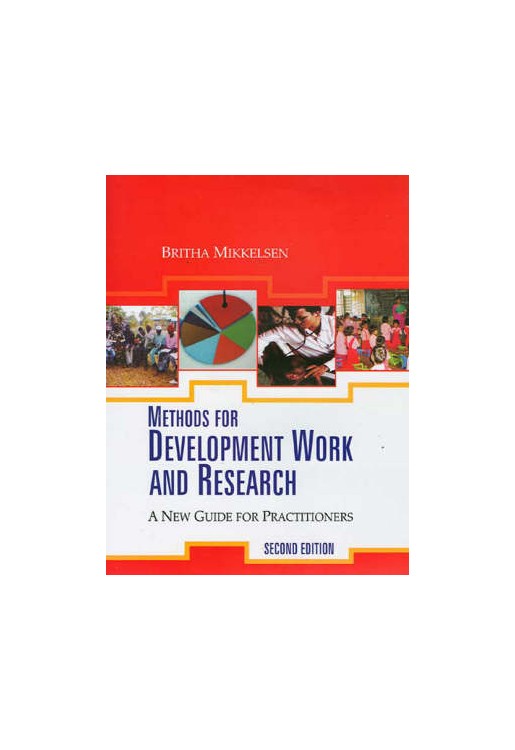Praise for the First Edition:
`It is a guide of vital importance to researchers, trainers and extension workers, especially those collaborating with communities in developing countries' -
European Journal of Development Research
`There is much of value here that even experienced development workers might learn from.... Mikkelsen offers many insights that would be valuable to any economist undertaking field work in development' -
The Australian Journal of Agricultural Economics
`An enthusiastic, vibrant supplement to methodology texts.... The formulation is concise, comprehensive, yet substantial' -
Business Line
`Development researchers will be grateful to Mikkelsen for her laudable job in competently assessing their needs.... She provides an overview of the traditional and the new techniques and tools for field study' -
Deccan Herald
This completely revised version of the successful 1995 text covers a wide range of issues relating to research concepts and methods. It incorporates new lessons that have been learned regarding the merits and pitfalls of development work.
Reflecting on how and why research in international development work has become a special case within the social sciences, this book provides innovative examples of participatory methods in action; methodological guidance on linking research purpose, questions and methods in qualitative and quantitative research; highlights new methods for development work and research like the Rights-based Approach, Appreciative Inquiry, the Social Capital Analysis Tool and Geomatics; emphasizes the gender perspective in development work; and discusses ethics, regulations and codes of conduct, as well as the question of encounters with `other` cultures. `Development researchers will be grateful to Mikkelsen for her laudable job in competently assessing their needs.... She provides an overview of the traditional and the new techniques and tools for field study' -- Deccan Herald An enthusiastic, vibrant supplement to methodology texts and help in;. The formulation is concise, comprehensive, yet substantial. -- Business Line Praise for the First Edition:
`There is much of value here that even experienced development workers might learn from.... Mikkelsen offers many insights that would be valuable to any economist undertaking field work in development'
The Australian Journal of Agricultural Economics
_____________________________________________________________________________________________________________________________________________________________
`An enthusiastic, vibrant supplement to methodology texts.... The formulation is concise, comprehensive, yet substantial' - -- Business Line
PART ONE: CONTEXT AND FOCUS OF THE GUIDE
Issues and Approaches in Current Development Co-Operation
Dialogue, Problem Identification and Planning Cycle
Target Groups, Readership and Terminology
PART TWO: PARTICIPATION IN DEVELOPMENT - THE CONCEPT AND CRITICAL PERSPECTIVES
Perceptions of Participation
Participatory Methods, Techniques and Tools
Strategic Considerations for Using Participatory Methods
Critical Perspectives on Participation
PART THREE: PARTICIPATORY METHODS IN USE
Illustrations of Selected Participatory Methods
Spreading Uses of Participatory Methods
Topical Applications of Participatory Methods
PART FOUR: DIFFERENT TYPES OF DEVELOPMENT STUDIES - PURPOSE, METHODS AND DESIGN
Types and Forms of Development Studies
Research Purpose, Goals and Focus
Research Methods and Possible Combinations
Research Process and Research Plan
PART FIVE: DATA GENERATION AND ANALYSIS OF QUALITATIVE DATA
Theory-Based Data Generation and Analysis
Analysis of Qualitative Data
Standards of Quality for Qualitative Research
PART SIX: SELECTED DEVELOPMENT ISSUES AND APPROACHES
A Rights-Based Approach to Development
Poverty Reduction - Evolving Agenda and Poverty Analysis
Women in Development and Gender Perspectives
Innovative Approaches - Appreciative Inquiry, Social Capital Assessment, Geomatics
PART SEVEN: MONITORING AND EVALUATION
Monitoring and Evaluation - for Accountability and Learning
Aid Evaluation, Basic Evaluation Designs and Primary Uses of Evaluation Findings
Participatory Monitoring and Evaluation
Impact Monitoring and Evaluation
Learning from M&E and Impact Studies
PART EIGHT: CONCLUSION ON ETHICS AND INTERVENTIONS
Images of 'the Others'
Interventions, Interference and Agents of Change
Dilemmas of Topics and Methods and Reminders on Conduct
Bibliography
Index


